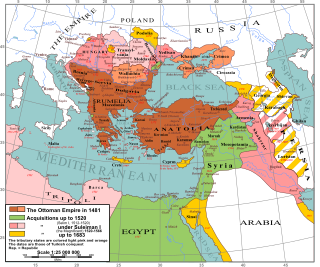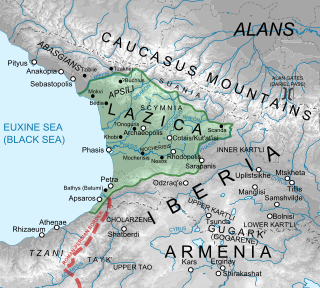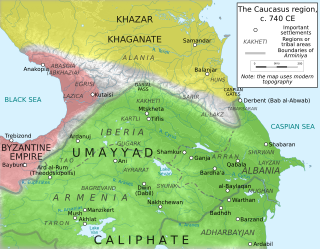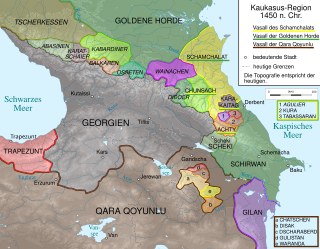 W
WAzat Mousa's invasion of Georgia took place from c. 1302 to 1303. The invasion was initiated by group of Turkoman tribes led by Azat Mousa, it is likely that they were connected with the Chepni clan, the main nomadic tribe in the hinterland of Pontus.
 W
WLala Mustafa Pasha's Caucasian campaign was a military expedition launched in 1578 by Lala Mustafa Pasha, a grand-vizier of the expanding Ottoman Empire. It is also considered a part of the larger conflict, Ottoman–Safavid War (1578–90).
 W
WThe Lazic War, also known as the Colchidian War or in Georgian historiography as the Great War of Egrisi, was fought between the Byzantine Empire and the Sasanian Empire for control of the ancient Georgian region of Lazica. The Lazic War lasted for twenty years, from 541 to 562, with varying success and ended in a victory for the Persians, who obtained an annual tribute in exchange for ending the war. The Lazic War is narrated in detail in the works of Procopius of Caesarea and Agathias.
 W
WMarwan ibn Muhammad's invasion of Georgia took place from 735 to 737. It was initiated by the Umayyad Caliphate. The goals of the campaign are disputed among historians. The Georgian historiography insists its main purpose was to finally break the stiff Georgian resistance against Arab rule, however, the western historians such as Cyril Toumanoff, and Ronald Suny, view it as a general campaign directed at both the Byzantine Empire, who exerted dominion over Western Georgia, and the Khazars, whose repeated raids affected not only Iberia and the whole Caucasus, but had in 730 reached Arab lands all the way to Mosul.
 W
WMongol conquests of Kingdom of Georgia, which at that time consisted of Georgia proper, Armenia, and much of the Caucasus, involved multiple invasions and large-scale raids throughout the 13th century. The Mongol Empire first appeared in the Caucasus in 1220 as generals Subutai and Jebe pursued Muhammad II of Khwarezm during the destruction of the Khwarezmian Empire. After a series of raids in which they defeated the combined Georgian and Armenian armies, Subutai and Jebe continued north to invade Kievan Rus'. A full-scale Mongol conquest of the Caucasus and eastern Anatolia began in 1236, in which the Kingdom of Georgia, the Sultanate of Rum, and the Empire of Trebizond were subjugated, the Armenian Kingdom of Cilicia and other Crusader states voluntarily accepted Mongol vassalage, and the Assassins were eliminated. Mongol rule in the Caucasus lasted until the late 1330s. During that period, the King George V the Brilliant restored the kingdom of Georgia for a brief period before it finally disintegrated due to Timur's invasions of Georgia.
 W
WCaucasian campaign of Pompey was a military campaign led by Pompey that took place in 65 BC and was a consequence of the third Mithridatic War fought over Georgian lands and its neighboring frontiers. Rome sought to expand its influence and establish itself as the overlord of the Middle East. After conquering the Kingdom of Pontus and receiving the subjugation of Tigranes II of Armenia the Romans marched on the Kingdom of Iberia, whose king, Artoces had been an ally of Mithridates VI of Pontus, Rome's premier enemy during the 80's, 70's and early 60's BC.
 W
WThe Red Army invasion of Georgia, also known as the Soviet–Georgian War or the Soviet invasion of Georgia, was a military campaign by the Russian Red Army aimed at overthrowing the Social-Democratic (Menshevik) government of the Democratic Republic of Georgia (DRG) and installing a Bolshevik regime in the country. The conflict was a result of expansionist policy by the Russians, who aimed to control as much as possible of the lands which had been part of the former Russian Empire until the turbulent events of the First World War, as well as the revolutionary efforts of mostly Russian-based Georgian Bolsheviks, who did not have sufficient support in their native country to seize power without external intervention.
 W
WThe Russo-Georgian War was a war between Georgia, Russia and the Russian-backed self-proclaimed republics of South Ossetia and Abkhazia. The war took place in August 2008 following a period of worsening relations between Russia and Georgia, both formerly constituent republics of the Soviet Union. The fighting took place in the strategically important Transcaucasia region. It was regarded as the first European war of the 21st century.
 W
WGeorgia, a Christian kingdom in the Caucasus, was subjected, between 1386 and 1403, to several disastrous invasions by the armies of Turco-Mongol conqueror Timur, whose vast empire stretched, at its greatest extent, from Central Asia into Anatolia. These conflicts were intimately linked with the wars between Timur (Tamerlane) and Tokhtamysh, the last khan of the Golden Horde and Timur's major rival for control over the Islamic world. Timur officially proclaimed his invasions to be jihad against the region's non-Muslims. Although he was able to invade parts of Georgia, he was never able to make the country Muslim and even recognized Georgia as a Christian state.
 W
WAfter the devastating invasions by Timur and subsequent enfeeblement of the Kingdom of Georgia, it soon faced a new threat. Timur's death in 1405 marked the beginning of the end of his Empire, unified only by fear and blood of the subjected peoples. Turkomans, particularly the Kara Koyunlu clan, were among the first to rebel against Shah Rukh who ruled most of the Persia and Mawerannahr. Qara Yusuf, ruler of the Kara Koyunlu, defeated Shah Rukh, captured Baghdad, and repulsed Timurids from western Persia. After they established themselves as the new leading power in the middle east. They took advantage of the temporary weakness of Georgians and launched attacks against them, apparently in which, George VII of Georgia was killed. Constantine I of Georgia, fearing further encroachment, allied himself with the Shirvanshah Ibrahim I to counter Turkoman advance and engaged them in the Battle of Chalagan, in which he was defeated and taken captive. In captivity Constantine behaved very proudly, which infuriated Qara Yusuf to such an extent, that he ordered his, his half-brother David's and 300 Georgian nobles' execution.